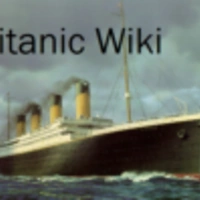No edit summary Tag: sourceedit |
No edit summary Tag: Visual edit |
||
| Line 13: | Line 13: | ||
}} |
}} |
||
| − | Lieutenant '''William McMaster Murdoch''' RNR (February 28<sup>th</sup>, 1873 - April 15<sup>th</sup>, 1912) was the First Officer aboard the RMS ''Titanic'', which sank in the Atlantic in 1912. Murdoch was on duty that night when he heard the shout: ''"Iceberg right ahead!''", before he famously replied: ''"Stop engines, hard a-starboard, full astern"'', and then rang the warning bell. |
+ | Lieutenant '''William McMaster Murdoch''' RNR (February 28<sup>th</sup>, 1873 - April 15<sup>th</sup>, 1912) was the First Officer aboard the [[RMS Titanic|RMS ''Titanic'']], which sank in the Atlantic in 1912. Murdoch was on duty that night when he heard the shout: ''"Iceberg right ahead!''", before he famously replied: ''"Stop engines, hard a-starboard, full astern"'', and then rang the warning bell. |
In two films about the ''Titanic'', Murdoch was portrayed shooting passengers and himself during the sinking; this was based on a number of eyewitness testimonies of a shooting/suicide by an officer during the launching of the last lifeboat. It is possible that Murdoch was the officer. At present there has been no evidence as yet to prove that William Murdoch was not the officer seen committing suicide. Murdoch has become a figure of controversy, with mystery surrounding the circumstances of his death and actions during the collision with the iceberg. |
In two films about the ''Titanic'', Murdoch was portrayed shooting passengers and himself during the sinking; this was based on a number of eyewitness testimonies of a shooting/suicide by an officer during the launching of the last lifeboat. It is possible that Murdoch was the officer. At present there has been no evidence as yet to prove that William Murdoch was not the officer seen committing suicide. Murdoch has become a figure of controversy, with mystery surrounding the circumstances of his death and actions during the collision with the iceberg. |
||
| Line 28: | Line 28: | ||
In 1903, Murdoch finally reached the stormy and glamorous ''North Atlantic'' run as Second Officer of the new liner ''Arabic''. His cool head, quick thinking and professional judgement averted a disaster when a ship was spotted bearing down on the Arabic out of the darkness. He overrided a command from his superior, Officer Fox, to steer hard-a-port, rushing into the wheelhouse, brushing aside the quartermaster and holding the ship on course. The two ships passed within inches of one another. Any alteration in course would have actually caused a collision. |
In 1903, Murdoch finally reached the stormy and glamorous ''North Atlantic'' run as Second Officer of the new liner ''Arabic''. His cool head, quick thinking and professional judgement averted a disaster when a ship was spotted bearing down on the Arabic out of the darkness. He overrided a command from his superior, Officer Fox, to steer hard-a-port, rushing into the wheelhouse, brushing aside the quartermaster and holding the ship on course. The two ships passed within inches of one another. Any alteration in course would have actually caused a collision. |
||
| − | The final stage of Murdoch's career began in May 1911, when he joined the new RMS ''Olympic'', at 45,000 tons. Intended to outclass the |
+ | The final stage of Murdoch's career began in May 1911, when he joined the new RMS ''Olympic'', at 45,000 tons. Intended to outclass the [[Cunard Line|Cunard]] ships in luxury and size ''Olympic'' needed the most experienced large-liner crew that the White Star Line could find. Captain[[ Edward J. Smith ]] assembled a crew that included [[Henry Tingle Wilde]] as Chief Officer, William Murdoch as First Officer, and Chief Purser [[Hugh Walter McElroy|Hugh W. McElroy]]. On June 14<sup>th</sup>, 1911, ''Olympic'' made her maiden voyage to [[New York]]. |
| − | The first indications of what was to come occurred on September 20<sup>th</sup>, when the ''[[Olympic]]'' had her hull badly damaged in a collision with the Royal Navy cruiser ''[[HMS Hawke]]''. Since Murdoch was at his docking-station at the stern of the ship during this |
+ | The first indications of what was to come occurred on September 20<sup>th</sup>, when the ''[[Olympic]]'' had her hull badly damaged in a collision with the Royal Navy cruiser ''[[HMS Hawke]]''. Since Murdoch was at his docking-station at the stern of the ship during this collision—a highly responsible position—he found himself giving evidence in the inquiry into an incident that turned into a financial disaster for the White Star Line, as the voyage to New York had to be abandoned and the ''Olympic'' taken to Belfast for repairs, which took a good six weeks. It was thus not until December 11<sup>th</sup>, 1911; that Murdoch rejoined his ship. During the time that he served aboard ''Olympic'' as First Officer (until some time in March of 1912) there were two further -though lesser- incidents, striking a sunken wreck and having to have a broken propeller replaced, and nearly running aground while leaving Belfast. |
However, upon reaching [[Southampton]], he learned that he had been appointed as Chief Officer of the new ''Titanic'', sister ship to ''Olympic'' and reputedly the largest and most luxurious ship afloat. [[Charles Herbert Lightoller|Lightoller]] later remarked that "three very contented chaps" headed north to Belfast, for he had been appointed First Officer, and their friend Davy Blair was to be the new second officer. Awaiting them would be an old Adriatic hand, [[Joseph Groves Boxhall]], as Fourth Officer, and others who would be familiar colleagues, including the now ageing [[Edward John Smith]], as Captain, and on the verge of retirement. |
However, upon reaching [[Southampton]], he learned that he had been appointed as Chief Officer of the new ''Titanic'', sister ship to ''Olympic'' and reputedly the largest and most luxurious ship afloat. [[Charles Herbert Lightoller|Lightoller]] later remarked that "three very contented chaps" headed north to Belfast, for he had been appointed First Officer, and their friend Davy Blair was to be the new second officer. Awaiting them would be an old Adriatic hand, [[Joseph Groves Boxhall]], as Fourth Officer, and others who would be familiar colleagues, including the now ageing [[Edward John Smith]], as Captain, and on the verge of retirement. |
||
==RMS ''Titanic''== |
==RMS ''Titanic''== |
||
| − | Thirty nine year-old Murdoch, with an "ordinary master's certificate" and a reputation as a "canny and dependable man" |
+ | Thirty nine year-old Murdoch, with an "ordinary master's certificate" and a reputation as a "canny and dependable man" had climbed through the ranks of the White Star Line to become one of its foremost senior officers. It was only natural that he was selected to be ''Titanic''<nowiki>'</nowiki>s Chief Officer, with sixteen years of maritime experience now behind him. |
Murdoch had originally been assigned as the ship's Chief Officer, though when the ''Titanic''<nowiki>'</nowiki>s skipper Edward Smith brought [[Henry T. Wilde]], his Chief from his previous command, Murdoch was temporarily reduced to First while First Officer [[Charles Lightoller]] was in turn reduced to Second. The original Second, [[David Blair]], would sit out the voyage altogether while the rest of the ship's complement of officers remained unchanged. |
Murdoch had originally been assigned as the ship's Chief Officer, though when the ''Titanic''<nowiki>'</nowiki>s skipper Edward Smith brought [[Henry T. Wilde]], his Chief from his previous command, Murdoch was temporarily reduced to First while First Officer [[Charles Lightoller]] was in turn reduced to Second. The original Second, [[David Blair]], would sit out the voyage altogether while the rest of the ship's complement of officers remained unchanged. |
||
| − | Murdoch was the officer in charge at the [[bridge ]] when the ''Titanic'' struck the iceberg on April 14<sup>th</sup>, 1912. He gave orders to |
+ | Murdoch was the officer in charge at the [[bridge ]] when the ''Titanic'' struck the iceberg on April 14<sup>th</sup>, 1912. He gave orders to "full speed astern" and "hard a-starboard." Some historians argue that reversing the engines gave a higher chance of hitting the iceberg than reducing the ship's forward motion and slowly turning the ship. |
Murdoch was put in charge of launching the the starboard lifeboats. He was also present at the [[Shooting at Collapsible C|shooting at Collapsible C]]. |
Murdoch was put in charge of launching the the starboard lifeboats. He was also present at the [[Shooting at Collapsible C|shooting at Collapsible C]]. |
||
| Line 51: | Line 51: | ||
==Portrayals== |
==Portrayals== |
||
===1943 Film === |
===1943 Film === |
||
| − | Murdoch is portrayed as "Officer Morlock |
+ | Murdoch is portrayed as "Officer Morlock." |
===1953 Film=== |
===1953 Film=== |
||
| − | In the [[1953 Film Titanic| |
+ | In the 1953 film [[1953 Film Titanic|''Titanic'']], Murdoch was portrayed by Barry Bernard. |
| − | ===A Night to Remember=== |
+ | ===''A Night to Remember''=== |
| − | [[File:Titanic Murdoch.jpg|thumb|220x220px|Murdoch in A Night To Remember]] |
+ | [[File:Titanic Murdoch.jpg|thumb|220x220px|Murdoch in ''A Night To Remember'']] |
In the 1958 film ''[[A Night to Remember (1958 film)|A Night to Remember]]'', he was portrayed by Richard Leech. |
In the 1958 film ''[[A Night to Remember (1958 film)|A Night to Remember]]'', he was portrayed by Richard Leech. |
||
| − | ===S.O.S. Titanic=== |
+ | ===''S.O.S. Titanic''=== |
In the 1979 made-for-television film ''[[S.O.S. Titanic]]'', he was played by Paul Young. |
In the 1979 made-for-television film ''[[S.O.S. Titanic]]'', he was played by Paul Young. |
||
===1996 Miniseries=== |
===1996 Miniseries=== |
||
| − | In the [[1996 Miniseries Titanic| |
+ | In the 1996 miniseries [[1996 Miniseries Titanic|''Titanic'']], Murdoch was portrayed by Malcolm Stewart. He is shown denying firemen access to the last lifeboat. He takes his gun, saying "I will shoot the next man who moves." Immediately someone tries to get past Murdoch, who indeed shoots him. He turns to two other officers who watched it all, and says to them "Well, gentlemen, I suppose it's every man for himself," and shoots himself. |
===1997 Film=== |
===1997 Film=== |
||
| − | [[File:Titanic - Character portal - Murdoch.png|thumb|Murdoch in the 1997 Film]]In the [[1997 Film Titanic| |
+ | [[File:Titanic - Character portal - Murdoch.png|thumb|Murdoch in the 1997 Film]]In the 1997 film [[1997 Film Titanic|''Titanic'']], Murdoch was portrayed by Ewan Stewart. It depicted him taking—but later rejecting—a bribe from first-class passenger, [[Caledon Hockley]], and shooting two men dead. After this, Murdoch saluted [[Chief Officer Wilde]] and committed suicide. |
===2012 Miniseries=== |
===2012 Miniseries=== |
||
[[File:Murdoch_2012.png|thumb|Murdoch in the 2012 Miniseries]] |
[[File:Murdoch_2012.png|thumb|Murdoch in the 2012 Miniseries]] |
||
| − | In the [[2012 Miniseries Titanic| |
+ | In the 2012 miniseries [[2012 Miniseries Titanic|''Titanic'']], Murdoch is portrayed completely ignoring the rule "women and children first." |
====Episode 2==== |
====Episode 2==== |
||
| − | Over |
+ | Over two weeks before the maiden voyage, Chief Officer Murdoch discusses the possibility of a terrorist attack on the ''Titanic'' with Captain Smith, First Officer Lightoller, and Second Officer [[David Blair]]. |
| − | On |
+ | On 9 April, all officers meet in a conference room on board he ship. [[Henry Tingle Wilde]] is announced to become Chief Officer, Blair is discharged off the ''Titanic'', and Murdoch and Lightoller both go down one rank. |
| − | On the Sunday evening of the maiden voyage, Smith wants to make a little |
+ | On the Sunday evening of the maiden voyage, Smith wants to make a little "headway" and arrive half a day earlier, but Ismay reminds him of the fact White Star doesn't try to gain the Blue Riband. Ismay goes to bed and Smith repeats his wish, even though Murdoch says they had a few ice warnings. |
Later, ''Titanic'' is sinking. Stewards [[Annie Desmond]] and [[Paolo Sandrini]] are filling a lifeboat with women and children. [[Fourth Officer Boxhall]] forbids Paolo from allowing Second Class women into the lifeboats from [[A Deck]], he thinks they have to board from the [[Boat Deck]]. Paolo almost clashes with Boxhall until Murdoch arrives and orders ''all'' women and children into the lifeboats. |
Later, ''Titanic'' is sinking. Stewards [[Annie Desmond]] and [[Paolo Sandrini]] are filling a lifeboat with women and children. [[Fourth Officer Boxhall]] forbids Paolo from allowing Second Class women into the lifeboats from [[A Deck]], he thinks they have to board from the [[Boat Deck]]. Paolo almost clashes with Boxhall until Murdoch arrives and orders ''all'' women and children into the lifeboats. |
||
| Line 82: | Line 82: | ||
Murdoch then heads to another lifeboat, where he calls for any more women. [[John Batley]] brings [[Muriel Batley|his wife]] towards the boat, and asks permission to join her. [[Second Officer Lightoller]] said 'no men' but Murdoch ignores that and allows Batley in. |
Murdoch then heads to another lifeboat, where he calls for any more women. [[John Batley]] brings [[Muriel Batley|his wife]] towards the boat, and asks permission to join her. [[Second Officer Lightoller]] said 'no men' but Murdoch ignores that and allows Batley in. |
||
| − | Before the Batleys can enter the lifeboat, most of the Maloney family run to the boat, where [[Mary Maloney]] suddenly gets trampled. [[Lord Manton]] helps to get her up. Muriel is also trampled, but John refuses help from Lord Manton. The Maloney family board [[lifeboat 15]], and Murdoch orders [[steward Hart]] to take charge. |
+ | Before the Batleys can enter the lifeboat, most of the Maloney family run to the boat, where [[Mary Maloney]] suddenly gets trampled. [[Lord Manton]] helps to get her up. Muriel is also trampled, but John refuses help from Lord Manton. The Maloney family board [[lifeboat 15]], and Murdoch orders [[steward Hart]] to take charge. He is not seen after this. |
==External links== |
==External links== |
||
Revision as of 04:20, 18 October 2017
Lieutenant William McMaster Murdoch RNR (February 28th, 1873 - April 15th, 1912) was the First Officer aboard the RMS Titanic, which sank in the Atlantic in 1912. Murdoch was on duty that night when he heard the shout: "Iceberg right ahead!", before he famously replied: "Stop engines, hard a-starboard, full astern", and then rang the warning bell.
In two films about the Titanic, Murdoch was portrayed shooting passengers and himself during the sinking; this was based on a number of eyewitness testimonies of a shooting/suicide by an officer during the launching of the last lifeboat. It is possible that Murdoch was the officer. At present there has been no evidence as yet to prove that William Murdoch was not the officer seen committing suicide. Murdoch has become a figure of controversy, with mystery surrounding the circumstances of his death and actions during the collision with the iceberg.
Life and career
Murdoch was born in Dumfries and Galloway, Scotland, the fourth son of Captain Samuel Murdoch, a master mariner, and Jane Muirhead, six of whose children survived infancy. The Murdochs were a long and notable line of Scottish seafarers who sailed the world's oceans as early as the 19th century; William's father and grandfather were both sea captains as were four of his grandfather's brothers and it is little wonder that he followed in the family tradition.
Murdoch was educated first at the old Dalbeattie Primary School in High Street, and then at the High School in Alpine Street until he gained his diploma in 1887. He was remembered as being an intelligent and hard-working scholar. Finishing schooling, he followed in the family seafaring tradition and was apprenticed for five years to William Joyce & Coy, Liverpool, but after four years (and four voyages) he was so competent that he passed his Second Mate's Certificate on his first attempt.
He served his apprenticeship aboard the Charles Cosworth of Liverpool, trading to the west coast of South America. It would have been a harsh apprenticeship, but it gave Murdoch the determination he needed to succeed. From May 1895 he was First Mate on the Saint Cuthbert, which was to sink in a hurricane off Uruguay in 1897. Murdoch gained his Extra Master's Certificate at Liverpool in 1896, at the age of 23. From 1897 to 1899 he was First Officer aboard the J.Joyce & Co. steel four-masted 2,534-ton barque Lydgate, that traded from New York to Shanghai.
From 1900 to 1912, Murdoch gradually progressed from Second Officer to First Officer, serving on a successive number of White Star Line vessels, Medic (1900 - along with Charles Lightoller, Titanic's second officer), Runic (1901-1903), Arabic (1903]), Celtic (1904), Germanic (1904), Oceanic (1905), Cedric (1906), Adriatic (1907-1911) and the Olympic (1911-1912).
In 1903, Murdoch finally reached the stormy and glamorous North Atlantic run as Second Officer of the new liner Arabic. His cool head, quick thinking and professional judgement averted a disaster when a ship was spotted bearing down on the Arabic out of the darkness. He overrided a command from his superior, Officer Fox, to steer hard-a-port, rushing into the wheelhouse, brushing aside the quartermaster and holding the ship on course. The two ships passed within inches of one another. Any alteration in course would have actually caused a collision.
The final stage of Murdoch's career began in May 1911, when he joined the new RMS Olympic, at 45,000 tons. Intended to outclass the Cunard ships in luxury and size Olympic needed the most experienced large-liner crew that the White Star Line could find. CaptainEdward J. Smith assembled a crew that included Henry Tingle Wilde as Chief Officer, William Murdoch as First Officer, and Chief Purser Hugh W. McElroy. On June 14th, 1911, Olympic made her maiden voyage to New York.
The first indications of what was to come occurred on September 20th, when the Olympic had her hull badly damaged in a collision with the Royal Navy cruiser HMS Hawke. Since Murdoch was at his docking-station at the stern of the ship during this collision—a highly responsible position—he found himself giving evidence in the inquiry into an incident that turned into a financial disaster for the White Star Line, as the voyage to New York had to be abandoned and the Olympic taken to Belfast for repairs, which took a good six weeks. It was thus not until December 11th, 1911; that Murdoch rejoined his ship. During the time that he served aboard Olympic as First Officer (until some time in March of 1912) there were two further -though lesser- incidents, striking a sunken wreck and having to have a broken propeller replaced, and nearly running aground while leaving Belfast.
However, upon reaching Southampton, he learned that he had been appointed as Chief Officer of the new Titanic, sister ship to Olympic and reputedly the largest and most luxurious ship afloat. Lightoller later remarked that "three very contented chaps" headed north to Belfast, for he had been appointed First Officer, and their friend Davy Blair was to be the new second officer. Awaiting them would be an old Adriatic hand, Joseph Groves Boxhall, as Fourth Officer, and others who would be familiar colleagues, including the now ageing Edward John Smith, as Captain, and on the verge of retirement.
RMS Titanic
Thirty nine year-old Murdoch, with an "ordinary master's certificate" and a reputation as a "canny and dependable man" had climbed through the ranks of the White Star Line to become one of its foremost senior officers. It was only natural that he was selected to be Titanic's Chief Officer, with sixteen years of maritime experience now behind him.
Murdoch had originally been assigned as the ship's Chief Officer, though when the Titanic's skipper Edward Smith brought Henry T. Wilde, his Chief from his previous command, Murdoch was temporarily reduced to First while First Officer Charles Lightoller was in turn reduced to Second. The original Second, David Blair, would sit out the voyage altogether while the rest of the ship's complement of officers remained unchanged.
Murdoch was the officer in charge at the bridge when the Titanic struck the iceberg on April 14th, 1912. He gave orders to "full speed astern" and "hard a-starboard." Some historians argue that reversing the engines gave a higher chance of hitting the iceberg than reducing the ship's forward motion and slowly turning the ship.
Murdoch was put in charge of launching the the starboard lifeboats. He was also present at the shooting at Collapsible C.
During the final moments of the sinking, he was seen attempting to launch Collapsible Lifeboat A. He was never seen again after Titanic disappeared into the Atlantic Ocean; Murdoch's body was never recovered.
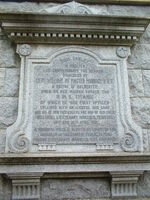
The memorial to Murdoch in Dalbeattie.
In his home town of Dalbeattie, Dumfries and Galloway, Scotland there is a memorial to his heroism and a charitable prize has been established in his name.
Portrayals
1943 Film
Murdoch is portrayed as "Officer Morlock."
1953 Film
In the 1953 film Titanic, Murdoch was portrayed by Barry Bernard.
A Night to Remember
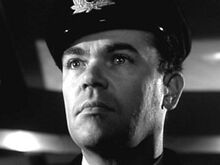
Murdoch in A Night To Remember
In the 1958 film A Night to Remember, he was portrayed by Richard Leech.
S.O.S. Titanic
In the 1979 made-for-television film S.O.S. Titanic, he was played by Paul Young.
1996 Miniseries
In the 1996 miniseries Titanic, Murdoch was portrayed by Malcolm Stewart. He is shown denying firemen access to the last lifeboat. He takes his gun, saying "I will shoot the next man who moves." Immediately someone tries to get past Murdoch, who indeed shoots him. He turns to two other officers who watched it all, and says to them "Well, gentlemen, I suppose it's every man for himself," and shoots himself.
1997 Film
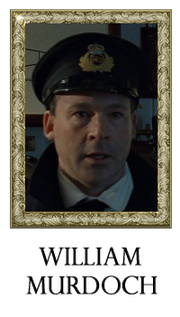
Murdoch in the 1997 Film
In the 1997 film Titanic, Murdoch was portrayed by Ewan Stewart. It depicted him taking—but later rejecting—a bribe from first-class passenger, Caledon Hockley, and shooting two men dead. After this, Murdoch saluted Chief Officer Wilde and committed suicide.
2012 Miniseries
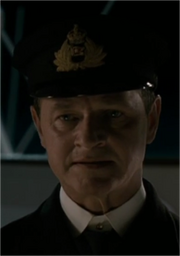
Murdoch in the 2012 Miniseries
In the 2012 miniseries Titanic, Murdoch is portrayed completely ignoring the rule "women and children first."
Episode 2
Over two weeks before the maiden voyage, Chief Officer Murdoch discusses the possibility of a terrorist attack on the Titanic with Captain Smith, First Officer Lightoller, and Second Officer David Blair.
On 9 April, all officers meet in a conference room on board he ship. Henry Tingle Wilde is announced to become Chief Officer, Blair is discharged off the Titanic, and Murdoch and Lightoller both go down one rank.
On the Sunday evening of the maiden voyage, Smith wants to make a little "headway" and arrive half a day earlier, but Ismay reminds him of the fact White Star doesn't try to gain the Blue Riband. Ismay goes to bed and Smith repeats his wish, even though Murdoch says they had a few ice warnings.
Later, Titanic is sinking. Stewards Annie Desmond and Paolo Sandrini are filling a lifeboat with women and children. Fourth Officer Boxhall forbids Paolo from allowing Second Class women into the lifeboats from A Deck, he thinks they have to board from the Boat Deck. Paolo almost clashes with Boxhall until Murdoch arrives and orders all women and children into the lifeboats.
Murdoch then heads to another lifeboat, where he calls for any more women. John Batley brings his wife towards the boat, and asks permission to join her. Second Officer Lightoller said 'no men' but Murdoch ignores that and allows Batley in.
Before the Batleys can enter the lifeboat, most of the Maloney family run to the boat, where Mary Maloney suddenly gets trampled. Lord Manton helps to get her up. Muriel is also trampled, but John refuses help from Lord Manton. The Maloney family board lifeboat 15, and Murdoch orders steward Hart to take charge. He is not seen after this.
External links
- Murdoch -The Man, the Mystery
- Lieutenant William Murdoch at Find A Grave
